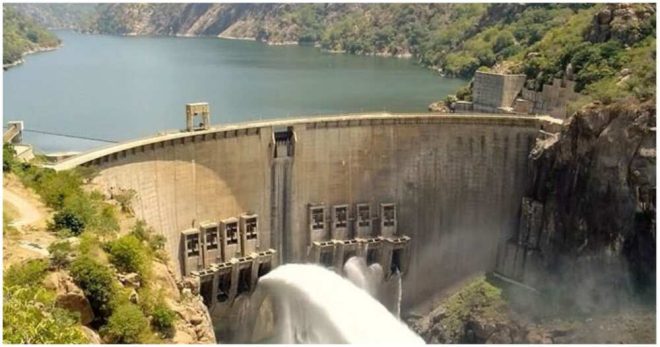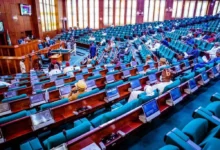
As water from the Lagdo dam in Cameroon is released, some states stated they had begun taking precautions to prevent widespread flooding.
The Cameroonian government notified NEMA by letter that it planned to release water from the Lagdo dam this weekend, urging NEMA to take preventative precautions.
Some jurisdictions stated they had already begun taking measures to avert loss of life and property damage due to flooding caused by the dam’s discharge of water. People in flood-prone areas have been urged to move out of states including Lagos, Benue, and Delta.
We have everything we need — LASEMA
The Permanent Secretary of the Lagos State Emergency Management Authority, Dr. Femi Oke-Osanyintolu, responded to yesterday’s warning from the Cameroonian government by assuring residents that the state is ready to respond swiftly to any emergency that may arise as a result of the upcoming flood.
The state government, he claims, has given LASEMA 144 units of facilities that can house 5,000 IDPs (Internally Displaced Persons).
“Lagos is ready,” he proclaimed. The focus of LASEMA has shifted from management to emergency management as a whole, as is evident.
By “improved strategy,” we mean that we have switched to clearing canals and making sure that municipal governments have a ready local response — in this case, the Environmental Guard.
The goal is to clear tertiary drains efficiently while also protecting the environment by working together to clear the secondary drain.
All principal emergency responders have been put on alert after we met with the chairs of 57 local governments. We are honing and bolstering our capacity for local responses.
”In order to identify the most at-risk residents in the event of an emergency, we have conducted risk assessments, mapped available resources, and launched directories in each municipality. All of these precautions are meant to guarantee rapid and efficient action.
To better prepare the local communities, we are implementing awareness and education campaigns.
Improved infrastructure and machinery mean that the flash floods that occur in Lagos often recede within 30 minutes to an hour. We’re all set.
The government of Benue has issued orders for the evacuation of floodplains and blocked drainages.
The Benue State Emergency Management Agency also responded by ordering everyone in the state to evacuate from flood plains to higher ground. After receiving word from Cameroonian authorities that they would be releasing water from the Lagdo dam on the Benue River in response to heavy downpour in Northern Cameroon, the Executive Secretary of the agency, Sir James Iorpuu, issued the warning yesterday in response to the alert from the Federal Government to states on the impending flood.
The executive secretary, speaking through the agency’s head of administration, Mr. Donald Komgbebda, said the agency is ramping up its awareness campaign to get people ready for the impending flood.
He stated, “Right now, we’re ramping up our awareness campaign across the state to get everyone out of the flood plains.”
We also intend to take measures to reduce the harm caused by the flood, but getting people to safety is our first concern right now.
While we do have backup plans, we will not subject our people to unimaginable suffering in the wake of the flood.
There will be a concerted effort by all parties involved to lessen the effects of the forthcoming flood.
All individuals living in low-lying areas along the River Benue and its flood plains have been urged to evacuate by Governor Hyacinth Alia.
Speaking at the launch of the distribution of food and nonfood items donated by the Federal Emergency Management Agency in response to the 2022 flood disaster in the state, the governor also urged residents to immediately begin cleaning up gutters and waterways.
IDP camps would be established without delay, says Delta’s government.
Delta State’s government has also pledged to take preventative measures in the face of flooding, saying it will not hesitate to establish IDP camps should the need arise.
“We are already opening drainages and demolishing illegal structures blocking the waterways,” Sir Festus Ahon, chief press secretary to the State Governor, said.
We think and hope that if we free up the drainages, we can mitigate some of the flood’s consequences. However, we suggest that people in coastal areas begin making plans to relocate to safer, higher terrain.
The state government has stated that they will establish IDP camps for flood victims if necessary. The state government of Bayelsa has appealed to the federal government for help.
Similarly, Mr. Daniel Alabrah, Chief Press Secretary to the Governor of Bayelsa State, said, “As a government, we have opened up major canals and water channels.”
Since last year’s floods and erosion, the governor has established a directorate for flood and erosion control.
Instead of only giving warnings, he encouraged the federal government to take action to assist the states in combating the threat of flooding.
According to him, the NIWA Act, which gives the federal government the authority to do things like dredge rivers, prevents us from doing so. There won’t be much of an effect on the states if the federal government does its share and dredges the Benue and Niger rivers.
We require significant participation from the federal government. Warnings and alerts issued by the federal government to the states are insufficient.
The state government is responsible for coastline protection at the moment in some municipalities, but you already know that because you read this.
The Director of African Affairs for the Cameroonian government, Umar Salisu, had previously sent a letter explaining the decision to open the Lagdo Dam in order to mitigate the flooding caused by the country’s recurrent rainfall.
It strongly recommended that NEMA implement preventative measures and educate locals in the affected areas promptly to mitigate the potential flooding impact.
The letter stated, “I have the honour to inform that the ministry is in receipt of a Note Verbale from the High Commission of the Republic of Cameroon informing that Cameroonian officials have resolved to open the flood gates of the Lagdo Dam on the Benue River in the days ahead due to heavy rainfall around the dam catchment area in Northern Cameroon.”
The Note states, “It is important to note that when water release is required, the authorities of Lagdo Dam will be releasing only modulated variable small amounts of water at a time in order to mitigate and avoid damages that the released water may cause along the River Benue basin in both Cameroon and Nigeria.
“In light of the foregoing, it would be much appreciated if the esteemed agency took all the necessary proactive steps and actions that would lessen the damage and educate the people who live in such areas to be vigilant and take all necessary precautions.”
The government of Cameroon has also advised people living in the impacted areas to stay calm and comply with authorities.
We have notified government agencies; now it is up to them to take appropriate action — NEMA
NEMA responded to the letter yesterday by saying it is not new and that it has previously warned state governors of upcoming floods.
Manzo Ezekiel, NEMA’s spokesperson, said impacted state governors must work with NEMA to protect lives and property. He explained, “The Ministry of Foreign Affairs sent a specific letter to the DG NEMA, and NEMA is the intended reader of that communication. We were expecting this message, so it did not come as a shock.
We anticipated this circumstance in our flood mitigation and response preparations this year.
We anticipated water releases in all our flood management programmes this year.
”Thus, NEMA has written to all state governments, including the governors of frontline states that may be affected by Lagdo Dam’s discharge of water.
“So what has happened now is just a way of confirming our programme, and the time has come for us to tell the government of the likely impacted states to match all the awareness information we have given them with actions so that people who live along the river areas would begin to have a plan to move away.
”The river bank overflows when water is released.
Thus, NEMA is ready and has began preparations long before.”
Source: Wakaaboutafrica.com














